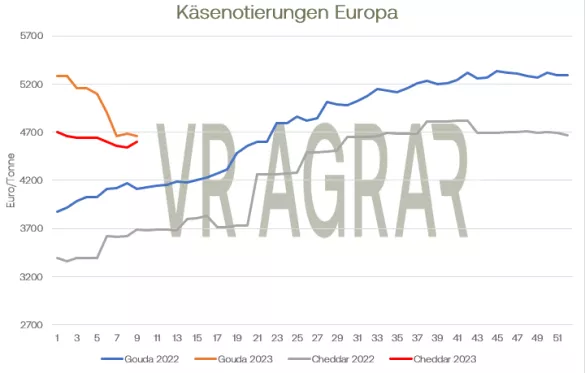The nationwide quantity of raw milk continues to increase and is still well above the previous year's level. In the entire year to date, around 3.3 percent more raw milk has been served compared to the same period. As a result, the concentrate markets tend to weaken again. Skimmed milk concentrate in particular is currently sufficiently offset by demand, while supply and demand for cream are balanced. According to calculations by the ife Institute, spot market milk fell by 2.6 cents/kg to 30.7 cents/kg on average across the country. The consumer prices for packaged butter fell again at the turn of the month in March. On average, consumers are now paying EUR 1.49 for the 250-gram pack, which is another 40 cents less than in February. The price quotation in Kempten remained stable at the reduced level yesterday at 4.98 to 5.24 euros/kg. The reduced consumer prices provide further impetus for consumer demand. Food retailers continue to constantly order goods from manufacturers. Block butter fell yesterday when it was listed on the southern German butter and cheese exchange.Domestic demand is again taking a more cautious approach, but the dairies are increasingly receiving demand from third countries. Butter prices on the EEX are somewhat weaker overall this week. In particular, the later dates for the second half of the year have given way again. The cheese prices interrupted the downward trend. For block goods, the listing commission set a slightly better trading range for the first time. Bread products were also able to increase in price. Demand from the food retail trade continues to be described as decent, but overall is at the usual volume level for this time of year. However, it is expected that the forthcoming Easter business could further stimulate the market. Demand from abroad is also increasing. The outgoing goods in the ripening warehouses are quite extensive, so that the stocks at the beginning of the month have decreased again. The cheese manufacturers are also satisfied with the orders from industry and bulk consumers. The reluctance to buy has recently been discarded again.Demand for food-grade skimmed milk powder has been calmer this week. The revival in February did not continue for the time being. The trading volume is lower again and focuses on short to medium-term delivery dates both in the domestic market and in the export business. The listing in Kempten remained unchanged yesterday, on the EEX weaker price tendencies were recently seen again, especially for the terms March to November. From September 2023, there will also be no buy offers in the open order book of EEX this Thursday. The prices for skimmed milk powder in animal feed quality have fallen. In particular, there are hardly any inquiries from the sales channel industry. Whole milk powder, on the other hand, is traded on a somewhat larger scale. Small but definitely increased orders come from the European market to the local manufacturers, which sometimes also result in deals. The listings were unchanged and the prices in the Global Dairy Trade Tender also hardly moved on Tuesday. Deuter Whole Milk Powder is still not fully competitive. Demand for whey powder is declining.Due to the dynamic cheese production, raw materials are available in large quantities, but there is a lack of drying capacity here and there. Deals continue to materialize, but in smaller volumes than in February. In terms of price, there is no clear direction for whey powder. The listing commission in Kempten lowered the trading range slightly at the lower end and increased it by 20 euros at the upper end.

ZMP Live Expert Opinion
The dairies adjusted their payout prices downwards significantly in January and February and have thus followed the development on the sub-markets. The current development in milk volumes is preventing any real signals that the markets are rising again, but the market is fundamentally supported by the competitiveness that has been gained and the very good consumer demand.


